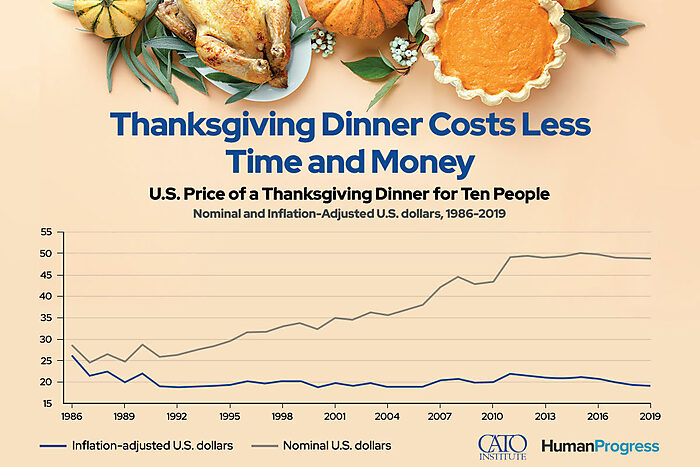"The American Farm Bureau Federation’s 34th annual survey of classic items found on the Thanksgiving Day dinner table indicates the average cost of this year’s feast for 10 is $48.91, or less than $5.00 per person. This is a 1-cent increase from last year’s average of $48.90.
“The average cost of this year’s Thanksgiving dinner is essentially unchanged from last year, after three years of decline since 2015,” said AFBF Chief Economist Dr. John Newton. “Americans continue to enjoy the most affordable food supply in the world"
"The centerpiece on most Thanksgiving tables – the turkey – costs slightly less than last year, at $20.80 for a 16-pound bird. That’s roughly $1.30 per pound, down 4% from last year. The survey results show that retail turkey prices are the lowest since 2010.
The shopping list for Farm Bureau’s informal survey includes turkey, stuffing, sweet potatoes, rolls with butter, peas, cranberries, a veggie tray, pumpkin pie with whipped cream, and coffee and milk, all in quantities sufficient to serve a family of 10 with plenty for leftovers.
Although the overall average cost of the meal was about the same this year, there were some price changes for individual items. In addition to turkey, foods that showed slight price declines include cubed bread stuffing and canned pumpkin pie mix. Foods showing modest increases this year included dinner rolls, sweet potatoes and milk. After adjusting for inflation, the cost of this year’s Thanksgiving dinner is $19.13, down slightly from last year."
"The AFBF Thanksgiving dinner survey was first conducted in 1986. The informal survey provides a record of comparative holiday meal costs over the years. Farm Bureau’s classic survey menu has remained unchanged since 1986 to allow for consistent price comparisons."



Also interesting: The percentage of income that Americans spend on food has been in a long-term decline by economist Mark Perry.
Related post:
Were The Pilgrims Capitalists Or Socialists?
